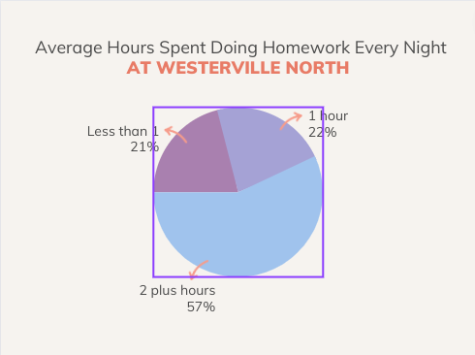Wake up, go to school, learn for six hours straight, go to extracurricular activities for quite some time, then go home. Once home, eat dinner, and finally when it’s 8 or 9 p.m., maybe even later, is it time to start the piles of homework that are needed to complete for the next day.
Students all across the country are experiencing the back to school season, and the hours of homework that come with it. According to a study at Stanford, students average about “3.1 hours of homework every night,” (Parker).
Avery Halterman, a freshman at Westerville North High School, is taking a combination of honors and AP classes.
“I have about two hours, maybe even three hours of homework every night. Sometimes it is just what you don’t get done in class, and I am a slow worker, so that tends to cause more homework every night,” Halterman said.
A lot of the homework that is assigned is what students and teachers alike call “busy work,” in order to keep the newly learned information inside students’ minds.
The same study conducted at Stanford found that students “often do homework they see as ‘pointless’ or ‘mindless’ in order to keep their grades up,” (Parker).
Karlee Michel, a Spanish teacher at Westerville North, believes this to be true. She has changed her policy on homework a lot over the past couple of years.
“I don’t give [homework]. I used to be sparse because it was the expectation. I just really didn’t agree with what kind of work we were giving and why. It also was like that’s just one more thing for me to plan and then grade. And at the same time I noticed when I was giving homework I would get email after email about not understanding or not being able to get it done because of this, this, this, and this,” Michel said.
Since homework takes up so much of students’ time, it leaves little time for extracurriculars and social time during the school year.
“I have my clubs that go after school, and if not going to sports, I am going to clubs. I spend hours doing homework, and I don’t really have time to hang out with my friends,” Halterman said.
Teachers stay beyond their regular school hours, and they see the long hours that the kids spend at school.
“I know that the kids are here for a long time because I see them here and I am also here for a good time and I was like it’s 9, and they probably haven’t gone home yet, probably haven’t eaten,” Michel said.
Not only is homework taking up most of the student’s time, it causes numerous emotions during the process as well.
Claire Gleason, a freshman at Columbus State this year, has dealt with the emotions that homework brings for years. She has seen the homework load through middle school, high
school, and now college.
“I definitely didn’t have the best attitude towards school and homework. I cried a lot, there were lots of tears and anger,” Gleason said.
According to Stanford, “56% of students said that homework is a primary source of stress. Less than one percent of students said that homework is not a primary source of stress,” (Parker).
“[I am] very stressed, and even after the fact. Even when [due date has] passed, I am still stressed over the fact that my grade may go down, or I’m stressed over the fact that it is still something that needs to get done, on top of everything that needs to get done that day,” Halterman said.

Many look forward to school starting because of the routine that will come with it. However many of these students get into this mindless routine that doesn’t need much attention and thought. They know how to get to their classes, and they know exactly what is happening after school.
“You just repeat the cycle and it’s just the same routine everyday. It can be soul crushing to do the same thing everyday,” Michel said.
Stanford stated that some of the students in the study said that their homework “led to sleep deprivation and other health problems…[such as] headaches, exhaustion, sleep deprivation, weight loss, and stomach problems,” (Parker).
Homework has long been a cause of great emotions for students, especially stress. It definitely plays a role in how successful a student is in a particular class.
“We are already at school 6 hours a day, why add two more? It really depends on the day. If you fall behind there is no catching up,” Halterman said.
Homework has long been a debated topic that will continue to be discussed and researched in the upcoming years. The question remains whether or not homework contributes to the success of students in high school and maybe even later on in life.























